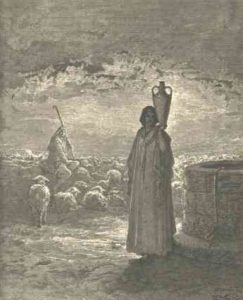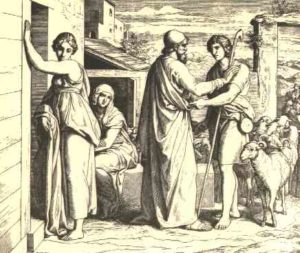Outline
Jacob comes to the well of Haran. (Verse 1-8.)
His interview with Rachel, Laban entertains him. (Verse 9-14.)
Jacob’s covenant for Rachel, Laban’s deceit. (Verse 15-30.)
Leah’s sons. (Verse 31-35.)
1 Then Jacob went on his journey, and came into the land of the people of the east.
[Hosea 12:12]
2 And he looked, and behold a well in the field, and, lo, there were three flocks of sheep lying by it; for out of that well they watered the flocks: and a great stone was upon the well’s mouth.
3 And thither were all the flocks gathered: and they rolled the stone from the well’s mouth, and watered the sheep, and put the stone again upon the well’s mouth in his place.
4 And Jacob said unto them, My brethren, whence be ye? And they said, Of Haran are we.
5 And he said unto them, Know ye Laban the son of Nahor? And they said, We know him.
[Gen 24:29]
6 And he said unto them, Is he well? And they said, He is well: and, behold, Rachel his daughter cometh with the sheep.
7 And he said, Lo, it is yet high day, neither is it time that the cattle should be gathered together: water ye the sheep, and go and feed them.
8 And they said, We cannot, until all the flocks be gathered together, and till they roll the stone from the well’s mouth; then we water the sheep.
These sons had gathered and were waiting for Rachel to arrive with her father’s sheep so as not to have to make her roll the heavy stone away by herself.
9 And while he yet spake with them, Rachel came with her father’s sheep: for she kept them.
10 And it came to pass, when Jacob saw Rachel the daughter of Laban his mother’s brother, and the sheep of Laban his mother’s brother, that Jacob went near, and rolled the stone from the well’s mouth, and watered the flock of Laban his mother’s brother.
[Exod 2:17]

11 And Jacob kissed Rachel, and lifted up his voice, and wept.
[Gen 33:4, Gen 45:15, 1st Cor 16:20, 2nd Cor 13:12, 1st Peter 5:14]

12 And Jacob told Rachel that he was her father’s brother, and that he was Rebekah’s son: and she ran and told her father.
[Gen 24:28]
“father’s brother” – another example of how the Bible loosely defines family relationship; from our perspective Jacob would have been Rachel’s “father’s sister’s son” or “first cousin” – note vs. 13 – “sister’s son” and how Laban calls Jacob his “brother” in vs. 15.
13 And it came to pass, when Laban heard the tidings of Jacob his sister’s son, that he ran to meet him, and embraced him, and kissed him, and brought him to his house. And he told Laban all these things.
14 And Laban said to him, Surely thou art my bone and my flesh. And he abode with him the space of a month.
[Gen 2:23, Judges 9:2, 2nd Sam 5:1, 2nd Sam 19:12]
Do not forget that Laban and his family, Rachel included, were Idol worshippers. Jacob at least had a family back home that believed in the one true God. That influence ceased for the next twenty years, twenty years that Jacob would be separated from his family, all because he manipulated his brother and feared for his life.
15 And Laban said unto Jacob, Because thou art my brother, shouldest thou therefore serve me for nought? tell me, what shall thy wages be?
16 And Laban had two daughters: the name of the elder was Leah, and the name of the younger was Rachel.
17 Leah was tender eyed; but Rachel was beautiful and well favoured.
[tender eyed = weak eyes]
18 And Jacob loved Rachel; and said, I will serve thee seven years for Rachel thy younger daughter.
[Gen 31:41]

19 And Laban said, It is better that I give her to thee, than that I should give her to another man: abide with me.
20 And Jacob served seven years for Rachel; and they seemed unto him but a few days, for the love he had to her.
21 And Jacob said unto Laban, Give me my wife, for my days are fulfilled, that I may go in unto her.
[Judges 15:1]
22 And Laban gathered together all the men of the place, and made a feast.
[Judges 14:10, John 2:9]
23 And it came to pass in the evening, that he took Leah his daughter, and brought her to him; and he went in unto her.
24 And Laban gave unto his daughter Leah Zilpah his maid for an handmaid.
25 And it came to pass, that in the morning, behold, it was Leah: and he said to Laban, What is this thou hast done unto me? did not I serve with thee for Rachel? wherefore then hast thou beguiled me?
[beguiled = deceived]
Jacob the “supplanter” who deceived his father and brother with the help of his mother, meets his match with uncle Laban. He is out-tricked and outsmarted by Laban who marries off what appears to be a hard-to-marry-off daughter (vs. 17).
26 And Laban said, It must not be so done in our country, to give the younger before the firstborn.
whether Laban’s excuse is true or not, it must surely have hit home for Jacob when Laban said the word “firstborn” – remember, it was Jacob who tricked the firstborn (Esau) out of a birthright and family blessing, and now the trick has come full circle back on him. [Gal 6:7]
27 Fulfil her week, and we will give thee this also for the service which thou shalt serve with me yet seven other years.
[Judges 14:1-12]
“her week” – though Laban’s family was not Jewish, it was a Jewish, and often an Oriental, custom to have a seven day wedding festival.
28 And Jacob did so, and fulfilled her week: and he gave him Rachel his daughter to wife also.
29 And Laban gave to Rachel his daughter Bilhah his handmaid to be her maid.
30 And he went in also unto Rachel, and he loved also Rachel more than Leah, and served with him yet seven other years.
Here we see that Jacob serves Laban for seven years (literally a week of years) for Rachel, but gets Leah in return. Jacob who tricked his father to steal his brother’s birthright now has a trick played on him by his uncle.
This week becomes very important prophetically speaking when you get to the ninth chapter of Daniel where we find out that it will sixty-nine week of years 483 years until Messiah is come and is cut off Daniel 9:23-27. It is the seventieth week of Daniel that is yet to come in which Israel is to go through the time of Jacob’s Trouble just prior to entering the Millenial Kingdom.
31 And when the LORD saw that Leah was hated, he opened her womb: but Rachel was barren.
note how vs. 30 says that Jacob loved Rachel more and Leah less and then vs. 31 says that Leah was “hated” – this, as most dictionaries will agree, will show, that one of the definitions of “hate” is “to love less” than something or somebody else. This definition will assist in greatly understanding such passages as Luke 14:26. What do you think Jesus is saying in Luke 14:26? Note how necessary it is to compare scripture with scripture in order to understand what the Bible is saying rather than just blindly jumping in with our own interpretations.
32 And Leah conceived, and bare a son, and she called his name Reuben: for she said, Surely the LORD hath looked upon my affliction; now therefore my husband will love me.
The name Reuben means “Behold, a son”
33 And she conceived again, and bare a son; and said, Because the LORD hath heard that I was hated, he hath therefore given me this son also: and she called his name Simeon.
The name Simeon means “hearing”
34 And she conceived again, and bare a son; and said, Now this time will my husband be joined unto me, because I have born him three sons: therefore was his name called Levi.
The name Levi means “joined, attached”
35 And she conceived again, and bare a son: and she said, Now will I praise the LORD: therefore she called his name Judah; and left bearing.
[Matt 1:2]
The name Judah means “celebrated”
We tend to be more sympathetic to Rachel because she was barren and because Jacob loved her while overlooking poor Leah. She was hated by Rachel and it was for that reason that Rachel was barren. Jealousy can turn into hatred if you will allow it enough place and time.
Commentary by Matthew Henry, 1710
Verse 1-8 – Jacob proceeded cheerfully in his journey, after the sweet communion he had with God at Beth-el. Providence brought him to the field where his uncle’s flocks were to be watered. What is said of the care of the shepherds for their sheep, may remind us of the tender concern which our Lord Jesus, the great Shepherd of the sheep, has for his flock the church; for he is the good Shepherd, that knows his sheep, and is known of them. The stone at the well’s mouth was to secure it; water was scarce, it was not there for every one’s use: but separate interests should not take us from helping one another. When all the shepherds came together with their flocks, then, like loving neighbours, they watered their flocks together. The law of kindness in the tongue has a commanding power, Proverbs 31:26. Jacob was civil to these strangers, and he found them civil to him.
Verse 9-14 – See Rachel’s humility and industry. Nobody needs to be ashamed of honest, useful labour, nor ought it to hinder any one’s preferment. When Jacob understood that this was his kinswoman, he was very ready to serve her. Laban, though not the best humoured, bade him welcome, and was satisfied with the account Jacob gave of himself. While we avoid being foolishly ready to believe every thing which is told us, we must take heed of being uncharitably suspicious.
Verse 15-30 – During the month that Jacob spent as a guest, he was not idle. Wherever we are, it is good to employ ourselves in some useful business. Laban was desirous that Jacob should continue with him. Inferior relations must not be imposed upon; it is our duty to reward them. Jacob made known to Laban the affection he had for his daughter Rachel. And having no wordly goods with which to endow her, he promises seven years’ service Love makes long and hard services short and easy; hence we read of the labour of love, Hebrews 6:10. If we know how to value the happiness of heaven, the sufferings of this present time will be as nothing to us. An age of work will be but as a few days to those that love God, and long for Christ’s appearing. Jacob, who had imposed upon his father, is imposed upon by Laban, his father-in-law, by a like deception. Herein, how unrighteous soever Laban was, the Lord was righteous: seeJud 1:7. Even the righteous, if they take a false step, are sometimes thus recompensed in the earth. And many who are not, like Jacob, in their marriage, disappointed in person, soon find themselves, as much to their grief, disappointed in the character. The choice of that relation ought to be made with good advice and thought on both sides. There is reason to believe that Laban’s excuse was not true. His way of settling the matter made bad worse. Jacob was drawn into the disquiet of multiplying wives. He could not refuse Rachel, for he had espoused her; still less could he refuse Leah. As yet there was no express command against marrying more than one wife. It was in the patriarchs a sin of ignorance; but it will not justify the like practice now, when God’s will is plainly made known by the Divine law, Leviticus 18:18,. and more fully since, by our Saviour, that one man and woman only must be joined together, 1st Corinthians 7:2.
Verse 31-35 – The names Leah gave her children, expressed her respect and regard, both to God and to her husband. Reuben, or See a son, with this thought, Now will my husband love me; Levi, or joined, expecting, Now will my husband be joined unto me. Mutual affection is both the duty and comfort of the married relation; and yoke-fellows should study to recommend themselves to each other, 1st Corinthians 7:33,34. She thankfully acknowledges the kind providence of God in hearing her. Whatever supports and comforts us under afflictions, or tends to our deliverance from them, God must be owned in it. Her fourth son she called Judah, or praise, saying, Now will I praise the Lord. This was he, of whom, as concerning the flesh, Christ came. Whatever is the matter of our rejoicing, ought to be the matter of our thanksgiving. Fresh favours should quicken us to praise God for former favours; Now will I praise the Lord more and better than I have done. All our praises must centre in Christ, both as the matter of them, and as the Mediator of them. He descended after the flesh from him whose name was “Praise,” and He is our praise. Is Christ formed in my heart? Now will I praise the Lord.
